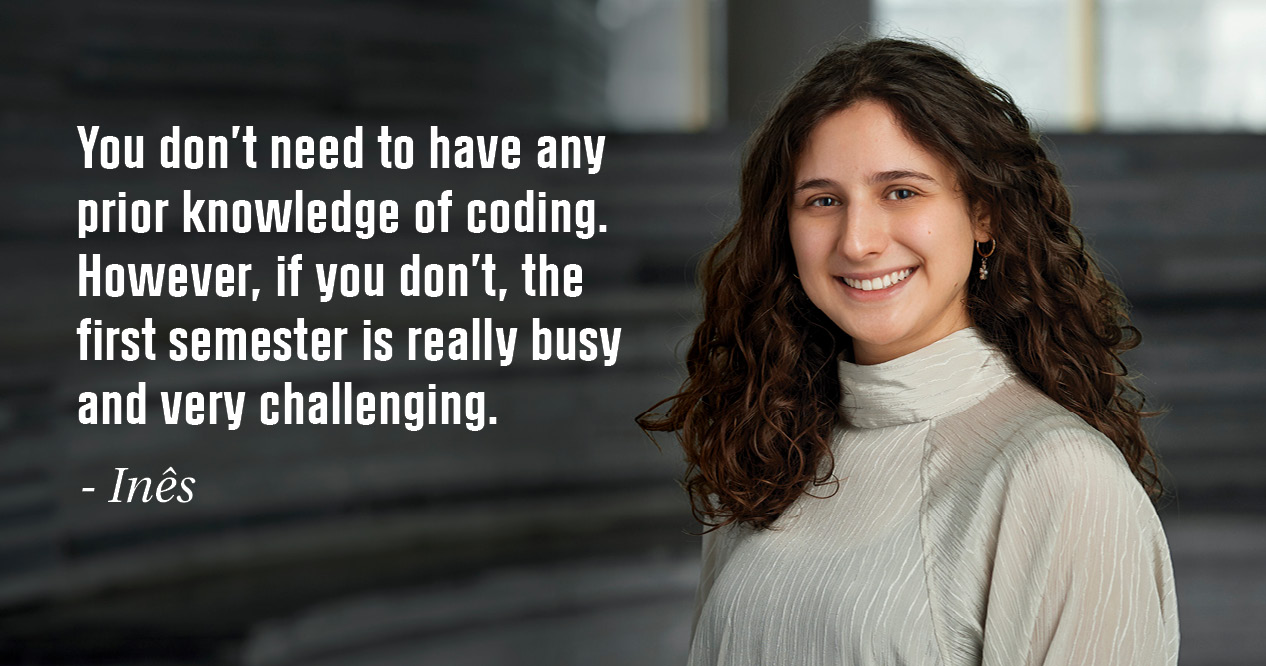Inês
Why did I choose my programme (and CBS)?
I decided to pursue this master’s degree after having done electives in the data science field. I understood how interesting it can be to extract insights from data and leverage it to help top management make wiser and more conscious decisions in businesses. Analysing this master programme and talking with past students helped me realise that the programme would provide me with a valuable toolkit to conduct analysis and with the skills to relate it to commonly faced business problems, so it is easily understood by people with non-technical backgrounds.
What do I like the best?
The international environment on the master’s is really nice. It allows you to meet people from all over the world. Additionally, the wide variety of backgrounds allows you to do group projects and other assignments during the master with people with different skillsets that are complementary to yours, which allows you to further develop your knowledge. This will not only allow you to leverage your strengths, but it will also allow you to work with people whose strengths are your weaknesses and they can teach you those.
How do I experience the difference in academic level between my bachelor and master programme?
I would say that the academic level in the master’s is way higher than in the bachelor programme. During the bachelor, despite busy periods and general stress related to exams and assignments, there was plenty of free time. However, in the master’s programme, we have constant assignments to be submitted, and the individual work that is expected to be done by the student is much higher. I would definitely say that in this master’s, there is a lot to keep up with, and it can easily become too much if you don’t manage your time wisely.

What are the biggest challenges in my programme?
The biggest challenge is definitely the speed to which you are expected to achieve a proficiency level of python and other programming languages. Coming from a non-technical background, my knowledge of programming languages was limited, but within a month of starting your classes, you are expected to have a good understanding of python and in the second semester, you are expected to be advanced user.
This combined with constant assignments for each class can make it very challenging.
What would I have liked to have known before starting my programme?
Before starting my programme, I would have liked to know how fast the teaching is for each class and how good you are supposed to be in coding in such a short period of time.
For example, in the first semester, you start by learning how to print “Hello World”. However, in the next semester, you are already doing Machine Learning where the focus is on the algorithms and not the code implementation (but you still need to know how to do the implementation).
What do I want to do after finishing my programme?
I have not yet decided what I want to pursue when I finish my master’s. However, as of now, I can see myself pursuing a career as a data scientist or an IT consultant.
Nonetheless, the career paths you can choose are many and varied, as this master’s provides you with a skill set that is highly demanded in different jobs, such as knowledge of R, Python, SQL, PowerBi, Tableau, Alteryx and others; which can be applied to different business areas.
If I could give myself a piece of advice, before starting it would be…
I would advise you to brush up on your coding skills, or start your learning process before the start of the master’s. You do not need to have any prior knowledge of coding, however, if you don’t, the first semester is really busy and very challenging.
Furthermore, I would advise you to work in different groups for each project and work with people that have complementary skills to yours to you maximise your learning experience.
